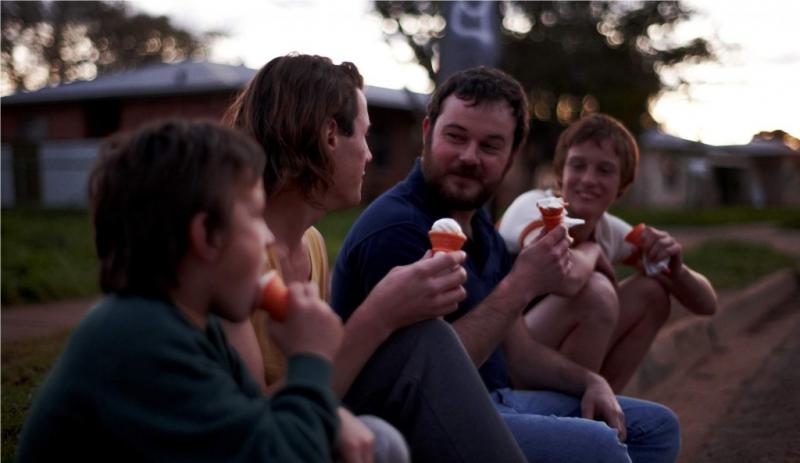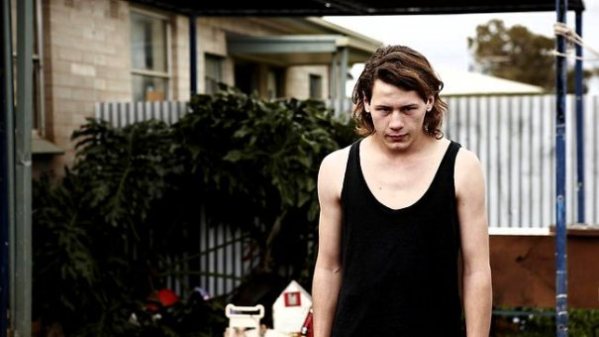Snowtown | reviews, news & interviews
Snowtown
Snowtown
The most painfully realistic serial-killer film yet

Snowtown gets as close as a film can to making you feel serial-killing’s human cost. It’s hard to thank Australian director Justin Kurzel for his extraordinary debut, so grim is the story it tells. But he and writer Shaun Grant have done a selfless, unsensationalist job of memorialising the 12 people murdered by a gang led by John Bunting in an Adelaide suburb, Snowtown, between 1992 and 1999. Kurzel, who grew up nearby, filmed in the area, and cast many non-professional locals.
We’ve been to Australia’s suburban badlands before, in Rowan Woods’ The Boys (1998) and David Michod’s Animal Kingdom (2010), two of the most queasily uncomfortable films of recent times. Snowtown is queasier. Adelaide’s far-northern edge has a reputation among Australians for depravity, and the place Kurzel shows us is socially shattered before John Bunting arrives. Elizabeth’s new boyfriend seems a decent bloke, happy to babysit, until he strips and photographs her kids. Afterwards he slopes round her house, nude and bored. Kurzel films the sequence of abuse flatly, as if in an affectless vacuum. Later we see Elizabeth’s 16-year-old, Jamie (Lucas Pittaway, pictured below), is being raped by his brother. Elizabeth has morals, but this abandoned world doesn’t. She’s too weak and alone in it to save her children. When John (Daniel Henshall) roars in on his motorbike and promises to rid Snowtown of its apparent paedophile plague, he’s greeted as a conquering hero.

John is short, pudgy, bearded, with bright eyes and a ready smile, more Father Christmas than Hannibal Lecter. But as abused women often recall, the man who battered them was always so charming at the start. Henshall plays John as that sort of charismatic, quick-witted bully, more aggressively intelligent than those around him, but still stuck in Snowtown, with a resentment that visibly simmers when he meets another ex of Elizabeth’s, whose family have mild aspirations, and whose head he’d plainly like to tear off. This adrift place is ripe for his one-man fascist regime, as with two accomplices he exterminates a widening list of “sub-human” scapegoats. In this serial-killer’s paradise he can dig a deep pit in his backyard and no one stares; tape recordings of terrified victims saying they’re leaving town is all it takes for them to disappear.
Only the torture before one murder is shown in the detail necessary for you to understand what John doesInsinuating himself into Elizabeth’s family, John becomes a father-figure to Jamie. A regime of cruelty and kindness batters this hulking, vulnerable adolescent, till when John brazenly reveals his secret life, he sees no exit. Soon, as happened with the real Jamie Vlassakis, he joins John’s gang. This incremental slide into evil is the film’s most fictionalised element, as many of the details of Vlassakis’s past have been legally suppressed. Pittaway, like Louise Harris, who plays his fierce but helpless mother, is part of the non-professional cast Kurzel picked up locally. The rowdy kitchen-table summits they conjure about gays and paedophiles, where John pounces on dissent, describe the choices of the film’s Jamie; the kind you get on a desert island, with Australian society unreachably far, when you don’t know what rescue is.
Only the torture before one murder is shown in the detail necessary for you to understand what John does, and dread it happening again. Warren Zevon once said all war films glamorise war, even supposedly anti-war ones. That seemed true of this genre. Even John McNaughton’s nominally realistic Henry: Portrait of a Serial Killer (1986) had a sly wit. In a previous generation, The Boston Strangler’s vérité killings were committed by Tony Curtis. Kurzel’s film is subtly elegant, not crude. But when each new killing neared I sat punch-drunk, thinking, please not another; surely this is when they were caught? Watching became so gruelling, I questioned the film’s right to exist. Isn’t cinema supposed to entertain? Later, though, I felt purged by getting so close to humans at their worst and most pitifully helpless, and finding they’re still human. Snowtown is a humble film which looks in horror’s face.
- Snowtown is on UK release from today
Watch the trailer for Snowtown
rating
Buy
Share this article
Add comment
The future of Arts Journalism
You can stop theartsdesk.com closing!
We urgently need financing to survive. Our fundraising drive has thus far raised £49,000 but we need to reach £100,000 or we will be forced to close. Please contribute here: https://gofund.me/c3f6033d
And if you can forward this information to anyone who might assist, we’d be grateful.

Subscribe to theartsdesk.com
Thank you for continuing to read our work on theartsdesk.com. For unlimited access to every article in its entirety, including our archive of more than 15,000 pieces, we're asking for £5 per month or £40 per year. We feel it's a very good deal, and hope you do too.
To take a subscription now simply click here.
And if you're looking for that extra gift for a friend or family member, why not treat them to a theartsdesk.com gift subscription?
more Film
 After the Hunt review - muddled #MeToo provocation
Julia Roberts excels despite misfiring drama
After the Hunt review - muddled #MeToo provocation
Julia Roberts excels despite misfiring drama
 London Film Festival 2025 - Bradley Cooper channels John Bishop, the Boss goes to Nebraska, and a French pandemic
... not to mention Kristen Stewart's directing debut and a punchy prison drama
London Film Festival 2025 - Bradley Cooper channels John Bishop, the Boss goes to Nebraska, and a French pandemic
... not to mention Kristen Stewart's directing debut and a punchy prison drama
 Ballad of a Small Player review - Colin Farrell's all in as a gambler down on his luck
Conclave director Edward Berger swaps the Vatican for Asia's sin city
Ballad of a Small Player review - Colin Farrell's all in as a gambler down on his luck
Conclave director Edward Berger swaps the Vatican for Asia's sin city
 London Film Festival - from paranoia in Brazil and Iran, to light relief in New York and Tuscany
'Jay Kelly' disappoints, 'It Was Just an Accident' doesn't
London Film Festival - from paranoia in Brazil and Iran, to light relief in New York and Tuscany
'Jay Kelly' disappoints, 'It Was Just an Accident' doesn't
 Iron Ladies review - working-class heroines of the Miners' Strike
Documentary salutes the staunch women who fought Thatcher's pit closures
Iron Ladies review - working-class heroines of the Miners' Strike
Documentary salutes the staunch women who fought Thatcher's pit closures
 Blu-ray: The Man in the White Suit
Ealing Studios' prescient black comedy, as sharp as ever
Blu-ray: The Man in the White Suit
Ealing Studios' prescient black comedy, as sharp as ever
 The Woman in Cabin 10 review - Scandi noir meets Agatha Christie on a superyacht
Reason goes overboard on a seagoing mystery thriller
The Woman in Cabin 10 review - Scandi noir meets Agatha Christie on a superyacht
Reason goes overboard on a seagoing mystery thriller
 London Film Festival 2025 - crime, punishment, pop stars and shrinks
Daniel Craig investigates, Jodie Foster speaks French and Colin Farrell has a gambling habit
London Film Festival 2025 - crime, punishment, pop stars and shrinks
Daniel Craig investigates, Jodie Foster speaks French and Colin Farrell has a gambling habit
 I Swear review - taking stock of Tourette's
A sharp and moving tale of cuss-words and tics
I Swear review - taking stock of Tourette's
A sharp and moving tale of cuss-words and tics
 A House of Dynamite review - the final countdown
Kathryn Bigelow's cautionary tale sets the nuclear clock ticking again
A House of Dynamite review - the final countdown
Kathryn Bigelow's cautionary tale sets the nuclear clock ticking again
 theartsdesk Q&A: Idris Elba on playing a US President faced with a missile crisis in 'A House of Dynamite'
The star talks about Presidential decision-making when millions of lives are imperilled
theartsdesk Q&A: Idris Elba on playing a US President faced with a missile crisis in 'A House of Dynamite'
The star talks about Presidential decision-making when millions of lives are imperilled

Comments
First time I watched this